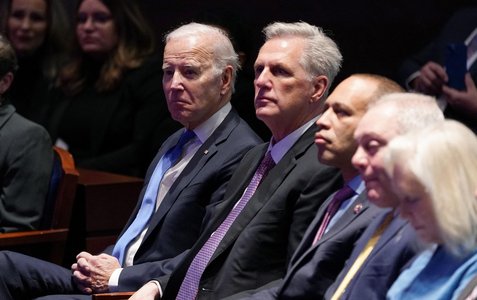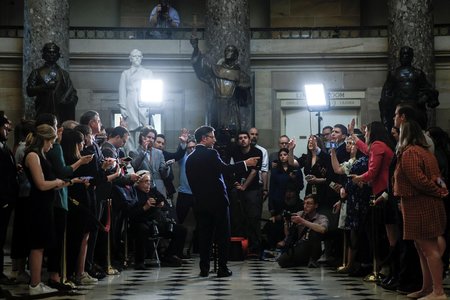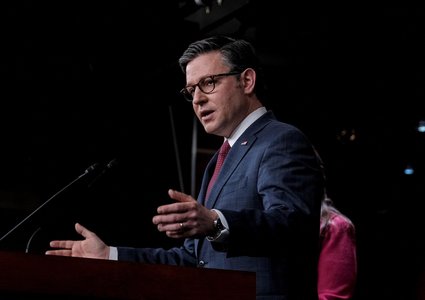McCarthy and Biden meet one on one to negotiate raising the debt limit. Plus, the seemingly stagnant conversation around police reform in the U.S. Join moderator Yamiche Alcindor, Ayesha Rascoe of NPR, Michael Shear of The New York Times, Ryan Nobles of NBC News and Susan Page of USA Today to discuss this and more.
Full Episode: Washington Week full episode, Feb. 3, 2023
Feb. 03, 2023 AT 9:02 p.m. EST
TRANSCRIPT
Notice: Transcripts are machine and human generated and lightly edited for accuracy. They may contain errors.
Yamiche Alcindor: The nation's looming debt crisis and demands for police reform.
Rep. Kevin McCarthy (R-CA): No agreements, no promises, except we will continue this conversation.
Yamiche Alcindor: The high-stakes first meeting between President Biden and House Speaker Kevin McCarthy on the nation's debt limit.
Then --
Unidentified Male: They went to the Rehoboth Beach house, and no classified marked documents were found.
Yamiche Alcindor: -- the FBI searches another one of President Biden's homes.
Plus --
Al Sharpton, President, National Action Network: I don't know when, I don't know how, but we won't stop until we hold you accountable and change the system.
Yamiche Alcindor: -- hundreds mourn at the funeral of Tyre Nichols and demand action against brutal police conduct. But passing police reform legislation is once again in doubt, next.
Good evening and welcome to WASHINGTON WEEK. This week, for the first time since Kevin McCarthy was elected House speaker, he and President Biden held a one-on-one meeting at the White House. The men discussed a long list of priorities, chief among them the ability to pay the nation's debt and avoid a financial crisis. President Biden is sticking to his position that he will not negotiate on raising the debt limit. McCarthy says, House Republicans will not take any action without spending cuts. But both McCarthy and the president said they hoped their meeting would set the tone for future of talks before the nation is scheduled to default this summer.
Joe Biden, U.S. President: Let's start treating each other with respect. That is what Kevin and I are going to do. Not a joke. It does not mean we are going to agree and fight like hell but let's treat each other with respect.
Kevin McCarthy: We both have different perspectives on this, but I thought this was a good meeting. We promised we would continue the conversation. We'll see if we can get here. I think at the end of the day we can find common ground.
Yamiche Alcindor: Meanwhile, the candidate field for the 2024 Republican presidential primary is starting to take clearer shape. Later this month, former U.N. Ambassador Nikki Haley is expected to announce she is running for president. She is the first of what is expected to be a long list of challengers to former President Donald Trump.
And there was even more news this week. The FBI searched another one of President Biden's properties. This time, it was his vacation home in Rehoboth Beach, Delaware. President's attorney said no additional classified documents were found but materials related to the time, President Biden's time as vice president, were taken by the FBI.
Joining me tonight to discuss this and more, Ayesha Rascoe, host of NPR's Weekend Edition Sunday and up for Saturdays, Michael Shear, White House Correspondent for The New York Times, Ryan Nobles, Congressional Correspondent for NBC News, and Susan Page, Washington Bureau Chief for USA Today. Thanks to all of you for being here.
So, Michael, I want to come to you. What is your reporting revealed about this meeting between Kevin McCarthy and President Biden? What are they saying behind closed doors about what they possible accomplished in this meeting?
Michael Shear, White House Correspondent, The New York Times: I think the kind of tone that you saw there in the clips that you played was definitely the approach that both sides wanted to start this conversation with but it won't be where it ends. And I think both understand kind of that. The closer that the nation's capital gets to a default, to an actual time when the rest of the world sees that the United States government is not going to pay its debts, things that it already -- that have already been committed, the harder that conversation is going to be.
And I don't think there was anything, at least in our reporting, that suggested that either President Biden or McCarthy, Speaker McCarthy, gave any ground, right? It was sort of setting a tone, kicking things off in a pleasant way, not being particularly nasty to each other. But maybe I am just a cynical reporter but I think we will get there. We will get to the nasty and we will get to the angry. And especially when you think about Speaker McCarthy's case, the way in which he is going to be pulled away from compromise by so much of the caucus, of the conference, that he leads, it is going to be really difficult to maintain that tone.
Yamiche Alcindor: What you are saying is that they were politely saying, I'm still going to stick to my guns but thank you for coming to the meeting.
Ryan, that brings me to you. I mean, on Capitol Hill, you have Republicans saying we need to have spending cuts, but former President Trump is saying do not touch Social Security, don't touch Medicare. What in the world do they actually want to cut? Is there consensus there?
Ryan Nobles, Capitol Hill Correspondent, NBC News: I would probably be here talking to you. I'd be breaking to Susan or another network, Yamiche, if I know the answer to that question.
But to Michael's point, I do think to a certain extent at least the White House has given a degree of ground, right, by just having this meeting. Joe Biden had initially said no negotiation around the debt ceiling. They had a conversation in which Kevin McCarthy came back to the Capitol and told us it was all about the debt ceiling. So, they are at least talking about it.
But to your point, Yamiche, the big problem that Republicans have right now is they do not know what to ask for aside from kind of a very general sense that they want to cut spending. You cannot get them to give anything specific. Would you take it from the Pentagon budget? Will you touch any entitlement programs? The closest we have come to any kind of substances, well, we should take back some of this money that has already been allocated through the COVID spending packages that have not been spent yet.
Well, that does not get you anywhere near the type of rollbacks that they are looking for in terms of really having an impact on the overall debt and deficit of the country. So, it is going to be very difficult for them to really make an argument here.
They do have a leverage point here. There has been some talk in Washington that you cannot use the debt ceiling as leverage. Have you met Congress? They use everything as leverage. And so I don't agree with that. This is a leverage point. But you cannot use it unless you can come to the table and ask for something to use that leverage for.
Yamiche Alcindor: And, Susan, what do you make of all of this, especially when you think about President Biden, his experience during the Obama administration, with all the different negotiating or non-negotiating that happened there?
Susan Page, Washington Bureau Chief, USA Today: Cynicism is almost always safe as default position to take in Washington. But I have to say, I just -- I think we should not ignore the fact that this was a pretty civil launch to a difficult discussion. And you can contrast that with the first meeting that President Trump had with a new speaker of the other party which left in catastrophe, left with Nancy Pelosi leaving the west wing of the White House, wearing that red coat and her sunglasses and eviscerating the president. We didn't have that. It is a sign of our times, though, President Biden said, we treated each other with respect, not a joke. That tells you where the level of discourse usually is here.
The White House did, I think, offer one thing that may be a possible off-ramp, which is to have negotiations about cutting spending and cutting the deficit that are parallel to the talks about the debt ceiling, so that they are not connected but they happen simultaneously.
Yamiche Alcindor: Yes, it is very interesting. And, Ayesha, I keep thinking if they stick both in their corners and President Biden says, I refuse to negotiate, and Republicans keep saying, we want spending cuts, if we end up defaulting, is there a political risk there? And if so, for who? Because I wonder when Americans, regular Americans, are not understanding the debt ceiling but they're seeing their 401(k)s hurt, are they going to look up and say, well, it is the Democrats, they are the ones in the White House?
Ayesha Rascoe, Host of Weekend Edition Sunday, NPR: I mean, well, look, there is a huge political risk to having the nation default. I don't know. I mean, to me, I feel like they would be blamed to go all around, like I think they would be, because at this point, you have Americans who are very dissatisfied with government overall. They feel like it does not work for them. This would be an argument in their case that it does not work for them.
I do think though right now, you do have both sides saying, we are going to start out cordial and they are not going to really negotiate right now because they have time. You got like several months. That is forever in D.C. terms. You do not have to start negotiating until like the rubber meets the road. The default is happening in two weeks. That is when you are really going to get the movement. Right now, it is just talking.
Ryan Nobles: Let's definitely not do anything with plenty of time. Let's not plan for it.
I think, Yamiche, to Susan's point about how cordial they were in this initial meeting, which I do think is important, I do think all of us think if it were just Kevin McCarthy and Joe Biden that we're making this decision, they probably could come to some consensus.
Kevin McCarthy's problem is that he really does not have control of his own future. He has a very hostile right-wing to his party that really want to use the debt ceiling as an example. They have threatened it time after time, came close in 2011. This is the time where they truly have the power to make something happen. And so as much as Kevin McCarthy does not want to do this, it may not be up to him because he doesn't have control of this conference.
Susan Page: You are up on the Hill all the time. Were any of the Freedom Caucus people unhappy with him for being so cordial at this first meeting?
Ryan Nobles: They are holding their fire at this point, right? They have not come right out and attacked him for that. I think they are going to give him a little bit of breathing room and a little bit space. They've won a lot of battles with Kevin McCarthy in the early stages of this. But as we get closer to this, as the deadline approaches, as you point out, that is when you are really going to start to see things heating up.
And Kevin McCarthy could easily get this done by getting Hakeem Jeffries into a room. There are more Republicans and more Democrats that want to see this done there than there are the very small number of conservative Republicans who do not want to see this done. But they have this motion to vacate that they could bring to the floor at any moment that could a speakership in peril.
Yamiche Alcindor: And, Michael, as we think about the economic realities of this, just today, we had a jobs report, unemployment fell to 3.4 percent, lowest since 1969. How does the economic reality factor into all of this?
Michael Shear: I mean, I think the White House was very quick today to seize on that jobs report as real evidence, as the president said in some remarks, that the cynics were wrong, that the critics were wrong, that his economic plan is working to keep the economy strong.
The challenge for the president is that there are all these sort of storm clouds ahead, right? It could be that the kind of aggressive job growth that we have had actually triggers the Federal Reserve to continue to raise interest rates even more aggressively, and that that turns the country sort of flips over to a recession.
Lots of economists disagree this was a sort of anomalous kind of piece of data. But the White House, inside the White House, what they are really hoping is that that does not happen, job growth continues strong, inflation, which has been moderating a little bit, continues to go down. And whatever the Republican argument is going to try to be over the next 18 months as the presidential election approaches, if the economy is strong, that is going to make it a lot harder for Republicans and a lot easier for President Biden, assuming he runs for re-election.
Yamiche Alcindor: And, Ayesha, Michael brings up the Republicans and, of course, 2024. We saw -- we are starting to see a number of people say that they're basically probably going to run. You have Nikki Haley, who is expected to run on February 15, expected to announce her bid. Larry Hogan might be looking at it, he says. Of course, there is Ron DeSantis in Florida. What do you make of sort of this field that is taking shape? What does that tell us about how the person who we used to cover together, Donald Trump, how weak he might be, or maybe how much his grip is still there?
Ayesha Rascoe: I mean, it shows that they think that he is weak enough that they will run against him, right? So, I mean, it certainly shows that they think he has some weaknesses. I think the issue for the GOP is that he is strong enough that he can be a wrecking ball in this primary. He is not going to go quietly. He is going to tear everyone down. And he is not going to walk away, like even if he were to lose.
So, I think that is the issue, is that he is willing to go as low as he has to go and he is willing to keep fighting even when it may is supposed to be over. He is not just going to go, well, let me do what is for the best of the party. It's what's best of Trump.
Yamiche Alcindor: I want to ask you, when you talk about sort of going low, there's, of course, what the Republicans are focusing on, which is, I think, tied to 2024. You have Ilhan Omar getting kicked off the foreign relations committee. You have Hunter Biden, even though he's sort of going on the offensive by writing to the DOJ saying, you need to look into this. Tell me a little bit about what you are hearing on the Hill as it relates to all of the things Ayesha was just talking about.
Ryan Nobles: Well, first, Ayesha makes such a great point, right? He just said not too long ago that he won an election that he didn't win. Who's to say he would treat a primary any differently? I think that has got to petrify Republicans right now.
But, separately, to your point about how this plays out on Capitol Hill, there are so many of the kind of MAGA talking points that have kind of become the Republican Party platform. And so this idea of heavy involved investigations specifically tied to Hunter Biden, these are all things that kind of percolated in the right-wing ecosphere that are now being put into practice by Republicans on Capitol Hill, particularly in the House of Representatives.
And the big problem for Republicans and for Kevin McCarthy is that because they only have a slim majority in the House, the idea of pushing through any kind of substantive legislation about the policy goals that they have is a fantasy. So, the only power that they have, and it is an important power, the oversight role that Congress has, this is the only tool they really have.
And they could use that to do true oversight of the Biden administration and there are things worth investigating, the withdrawal from Afghanistan, COVID origins, the way COVID payments were made, those are all things they're doing. If that is something that they do and it's legitimate, I think the American people will recognize it. But if it quickly dives into everything goes back to Hunter Biden, that is where I think they run a serious risk here. And that, I think, will tell us a lot about 2024 and where the power is in the Republican Party.
Yamiche Alcindor: And all of that is such an interesting part of things that we are going to have to cover.
I have to also say, we are going to make a little bit of a hard turn here, Susan, because there is, of course, the Chinese balloon. I don't know how to have a show on this Friday without talking about this thing. It is floating hopefully not over D.C., from my understanding. But what do you make of the fact that this thing is floating out there? I watched the Pentagon briefing. I came away not feeling any better about what the situation is. What do you think about the situation that we're in right now?
Susan Page: So, a spy balloon from China that they say is a weather balloon, and no one in America believes is a weather balloon. And it is like the comic relief. I mean, not that it is not serious, and we should take it seriously and we want to bring it down safely and all of that, but, really? It is a spy balloon in 2023? I guess I don't know what to make of it.
I guess -- I'll tell you the one thing you can make of it. U.S. relations with China, which have been fraught, are getting worse. And the idea that our relation with China could get somewhat better with the trip Secretary of State Blinken was supposed to make tonight, leave tonight, for China is off indefinitely. And I think we are into more difficult times with China, not easier times, and this balloon is part of that.
Yamiche Alcindor: And it seems like the Biden administration, they don't seem -- there are no alarm bells going off at the White House, it sounds like.
Michael Shear: No. I mean, to the broader point about the relationship, I think that there is a lot of concern about that. I think about the balloon itself, the best indication of a lack of sort of real crisis was that they did not immediately shoot it down, or somehow take it down, right? They seem to have assessed that it is not any sort of serious threat either to people or to intelligence gathering. And so it sounds like what they want to do is to let the wind kind of blow it offshore the way the weather just kind of like heads from west to east and eventually it will depart.
Yamiche Alcindor: Yes, that is what they're saying at the Pentagon briefing today, that it is not an immediate threat. So, that's where we're going to leave it.
Meanwhile, we have to also talk, of course, about the somber part of this week, which is that hundreds of people attended the funeral for Tyre Nichols, the 29-year-old black man who died after being beaten by Memphis police last month.
At service, his mother, RowVaughn Wells, said she hopes his death would not be in vain. And Vice President Kamala Harris called for legislation to hold police accountable.
RowVaughn Wells, Tyre Nichols' Mother: The only thing that's keeping me going is the fact that I really should believe my son was sitting here beside me from God. And I guess now his assignment is done, he has been taken home.
Kamala Harris, U.S. Vice President: Tyre Nichols should have been safe. We demand that Congress pass the George Floyd Justice in Policing Act. Joe Biden will sign it.
Yamiche Alcindor: Still, any meaningful progress for passing policing reform is an uphill battle. The last effort to pass a policing bill failed in the Senate in 2021. And one of the lead negotiators at the time, Republican Tim Scott, said he hopes this time will be different.
Sen. Tim Scott (R-SC): We want only the best wearing the badge in this great nation. But politics too often gets in the way of doing what every American knows is common sense.
Yamiche Alcindor: So, Ayesha, I want to come to you. What are you hearing from people who frankly are most impacted by this, which I have to say is African-Americans who are killed at 2.5 times the rate of white people were killed, as African-Americans have 2.5 times the rate of white Americans. Is there a change or people sort of wanting -- I know people are wanting change, but people believing that there can be change, even on the local level?
Ayesha Rascoe: I think that it is really difficult. I think that what I am hearing when I talk to people is really just exhaustion. Michelle Martin of NPR was down in Memphis and she talked about how, even when she talked to people there, that so many of them were saying that they had had run-ins with Memphis police, or people they knew and loved had had run-ins with Memphis police that were not good and that were dangerous.
And so I think that there is just an issue where, yes, people are concerned about crime, the people affected by crime and oftentimes it is poor black people. But they are also concerned about police brutality and being beaten and having to worry about just getting home.
And right now, I don't know that the federal government offers much relief because the idea of Congress being able to act seems very farfetched at this point. They could not do it after George Floyd. It's going to be very difficult to do it now in this divided Congress.
And so what can happen at the local level? I think there is pressure to try to make some differences. They disbanded this part of the police force that was able to do this, the Scorpion part. But at the same time, it is like what is going to happen, what is going to be done, and I do not think we have good answers.
Yamiche Alcindor: And I want to ask you really quickly about just the trauma that you are hearing from black people and people in this country who, apart from obviously calls for change, part of the funeral was just mourning the loss of someone who should be here to raise his four-year-old child.
Ayesha Rascoe: Yes. I mean, the thing of it is like every life has worth, right? So, it's like this person, Tyre, he was a skateboarder, he was a father, he was beloved. This was that his mother, that was her baby. I know I have a son until forever. He will always be my baby. And she lost him. And I just think there is just a pain in that that we carry that is physical, that is meaningful. And I don't think this country fully deals with it because it is too much.
Michael Shear: And can I say -- I mean, I think -- I totally agree and I think that one of the sad things that this reminds us is the disconnect between that kind of trauma and policymaking. It used to be sort of the idea that like when something traumatic happened, it would trigger action, right? It would trigger politicians, lawmakers, presidents to act.
And whether it is 20 little children getting killed at Sandy Hook or it's immigrants dying crossing the Rio Grande or whether it is George Floyd or others, or Tyre Nichols dying, and this policing, we are at a point and we are at a paralysis in Washington where even the most traumatic, horrible things that happen are not enough to trigger political action and there is no response. And I think that is what leaves so many Americans so deeply frustrated with these situations.
Susan Page: And the challenge, I think, for President Biden in his state of the union address next week as well, we know he is going to talk about police reform. How could he not? But will he have something new to say? Is there some fresh approach? I mean, if it couldn't pass, if the George Floyd Act couldn't pass in the wake of his death and with Democrats controlling both Houses of Congress, it is not going to pass now, is there something else that leadership could do that gets us to a different place in this terrible stalemate?
Yamiche Alcindor: And it's interesting. I mean, when you talk about sort of the stalemate, Ryan, Jim Jordan surprised me because he said the police misconduct is a form of the weaponization of the government, which I was like I had to do a double take. But he also said in the same breath he cannot think of any law that would stop what happened to Tyre Nichols. So, what are you hearing from Republicans. Are they echoing Jim Jordan?
Ryan Nobles: Well, define police misconduct, Yamiche. For a Republican like Jim Jordan, it would be the FBI raiding Mar-a-Lago to find classified documents that were inappropriately taken. It would be Capitol police officers roughing up January 6th protesters, as they're called, as they were storming the Capitol illegally. That is part of the problem that we have in Washington that Michael points to. People are talking past each other.
Even these things that we think would be kind of basic knowledge that we all agree upon, a problem like police brutality or law enforcement run amok, different Americans have different definitions for those. And particularly in the House of Representatives, those members are speaking specifically only to those constituencies.
So, the second you start talking about police reform, the first thing Republicans do is run tape of Democrats saying defund the police. And the first thing that happens on the other side is that they accuse Republicans of not being serious about this. So, just like Michael talked about, it is the same conversation we have about guns, it's the same conversation we have about immigration. Everybody just retreats back to the talking points and no one is interested in that consensus in the middle.
There's a big difference between not changing anything and defunding the police, right? There is some sort of middle ground there that can be found. But it is so elusive because there is no political benefit to it right now.
Yamiche Alcindor: And, Ayesha, I want to come to this idea that I've been talking to people about, which is can you even legislate hearts and minds? Of course, people, even civil rights leader say, we need to have new laws, but there is also this sort of lack of humanity that people think they are seeing when they see frankly that they do see, when they see Tyre Nichols being beaten the way that he was beaten, especially as he is calling out for his mother and the same with George Floyd called out for his mother.
Ayesha Rascoe: Well, I mean, look, we have to use the word, we have to talk about, even though these were black police officers, there is an idea of policing that is rooted in white supremacy. Like that is something that people make the argument over and over again, and that when you have black bodies, and that they are not -- that black people are not valued enough.
So, if you are in a position of authority, you may feel like you can get away with treating this person like they are not human versus the way you would treat somebody who is white and innocent, and that is just a fact. And we have to really deal with that if we are going to deal with the issues of police brutality in this country.
Ryan Nobles: And that gets back to not just funding police reform. It talks about funding education. It talks about funding food programs to eliminate things like food insecurity and poverty. This is all part of the systemic problems that lead to the situation that we saw in Memphis that lawmakers just do not want to have a serious conversation about.
Yamiche Alcindor: I mean, even as -- and we only have ten seconds, even as Ryan talks about education, we think about the fact that the A.P. African-American studies is being watered down. So, it is a tough place to be.
Ayesha Rascoe: It is a tough place to be. And I think Ryan was exactly right, we are talking past each other. And like even when it comes to what our history is and what we want to learn, we are not talking the same language.
Yamiche Alcindor: Yes. We will have to leave it there tonight. Thank you to all of our panelists. Thank you for your reporting and your insights.
And be sure to tune into to "PBS NEWS WEEKEND" for the latest on the unprecedented political and humanitarian crisis in Haiti. I'm Yamiche Alcindor. Good night from Washington
FROM THIS EPISODE


Clip: Will renewed talk of police reform lead to real changes after death of Tyre Nichols?


Clip: How the debt ceiling debate between White House, Republicans may end
MOST POPULAR


Full Episode: Washington Week with The Atlantic full episode, 4/19/24


Clip: Will Democrats rescue Johnson's speakership to protect aid for Ukraine and Israel?


Clip: Attacks in Israel and Iran bring more uncertainty to Middle East

Preview: Coming Up on Washington Week with The Atlantic


Full Episode: Washington Week with The Atlantic full episode, 4/12/24

© 1996 - 2024 WETA. All Rights Reserved.
PBS is a 501(c)(3) not-for-profit organization

